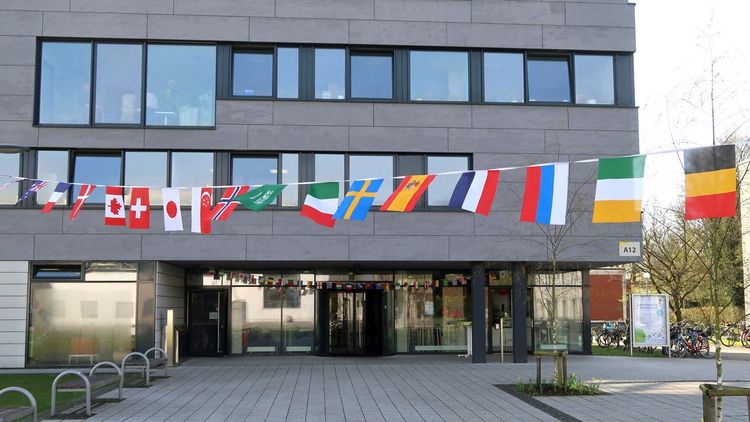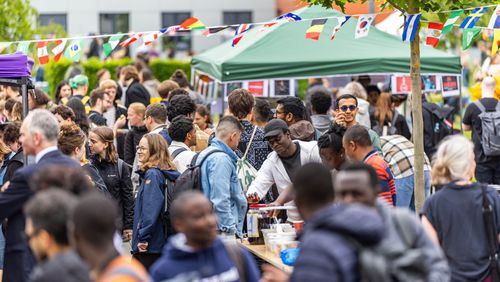Spending one or two semesters studying abroad is something many students dream of. In this interview Jenka Schmidt, head of the University's International Office, talks about what is possible now and what the situation could be once the pandemic is over.
Ms Schmidt, we're now in the second year of the pandemic. Travelling is still difficult and many universities are starting their third online semester in a row. Are there students who are heading abroad despite this?
Yes, interest remains strong. In the summer semester that just began, 37 exchange students have come to Oldenburg and another 5 are studying remotely from their home country, while just under 40 have left Oldenburg for a semester. About three-quarters of them are in Europe and a quarter of them outside Europe. Only a few are staying at home and doing an exchange on a purely online basis. And applications for semesters abroad are on the rise again for the winter semester.
How has the situation affected work at the International Office?
Although fewer students are going abroad at present, we have more work to do in preparing individual stays. Any kind of mobility is very individualized at the moment: What are the entry regulations or quarantine rules for a specific country, or even region? How is teaching organized at the respective university, and also specifically for the chosen subject? This involves a lot of research and communication with the partner universities. The rules are constantly changing, also regarding funding opportunities, so we have to stay up to date...
How is the International Office supporting students who come to Oldenburg?
We provide bilingual information on our website about things like quarantine rules and testing options. That's important, especially if you're not familiar with Germany’s federal system, with different rules applying from state to state. We have many support services at the University; our tutors can help with shopping, for example. Online learning also leaves many students feeling isolated. So we try to connect our international students with each other via social media and StudIP [the learning management system], and we also offer digital game nights or cooking tutorials, for example.
Besides the coronavirus pandemic there's also Brexit. The UK will no longer be an associated country in the European exchange programme Erasmus+. What does this mean for students who want to spend an exchange year in England, for example?
The current Erasmus programmes are still secured until 2022. And we have been in contact with our British partner universities, the German Academic Exchange Service (DAAD), the British Council and others for at least two years. In effect, Brexit means that we are now trying to conclude agreements with individual British partner universities to clarify issues such as tuition fees. Up to now, Erasmus students in the UK have not had to pay any fees. Fortunately, a number of British partner universities have already signalled that they would like to maintain the cooperation.
The pandemic has also brought certain advantages. For example, some students have been able to take online courses offered by their home university despite being abroad. Will student mobility be different in the future?
Yes, definitely! How exactly, no one can say right now. Some digital formats will be maintained for reasons of inclusion and sustainability. There are some great digital platforms for academic exchange, for instance for conferences. In addition, in the future virtual workshops could be used to prepare students for stays abroad. The DAAD project Lehramt International is a very good example. Students could use such workshops to take a look at content from partner universities, get to know future tutors, meet fellow students and gain their first intercultural experiences. Virtual courses are also a good possibility for those for whom physical mobility is not an option. The student body is becoming more and more diverse – and not everyone has the option to simply go abroad.
Will this replace actual mobility?
No, many students and academics want physical mobility. I can't imagine that many of the goals associated with internationalization can be achieved any other way. There are many experiences that you can only have by going to a certain place. For example, immersion in a culture, or the practical experiences you need if you want to work abroad.
What can we at the University of Oldenburg learn from the pandemic when it comes to internationalization?
The University has become much more international in recent years. We now have the degree programme European Studies in Global Perspectives for example, which offers modules in English for exchange students. The Instep programme emerged from the orientation year for refugees, and is designed to prepare international students for their studies, as well as support them during the first semesters. And the lecturers in the international Master's programmes are familiar with bilingualism and internationality. But if international students aren't coming to the campus or can't get into the country, lecturers, for instance, will need additional skills, for example in online teaching. These are new challenges that need to be taken into account in the future – also to prevent students from dropping out in the long term.
So there will be a combination of physical mobility and digital formats...
It remains an area of conflicting priorities. The big challenge is that something like the coronavirus pandemic could happen again and again. So we have to be flexible. The world is highly dynamic and we must adapt to that. Our job as a university is to create reliable options and opportunities for students - whether digital or on campus - to support them as much as possible.
Interview: Constanze Böttcher




